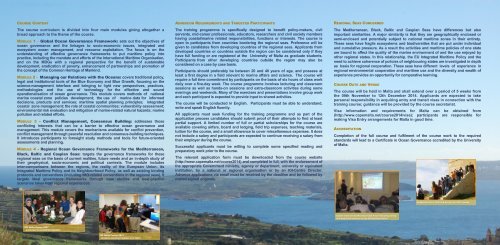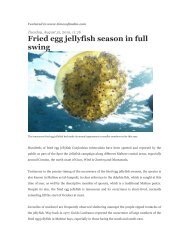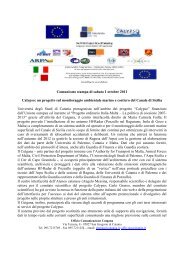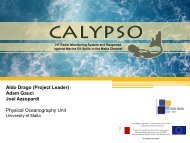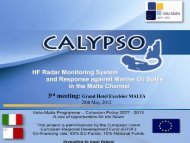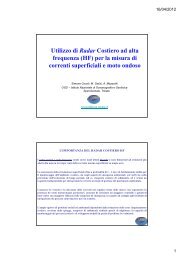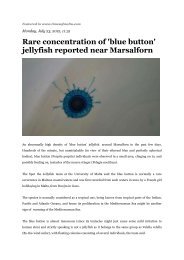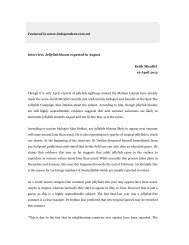Course Flyer - University of Malta
Course Flyer - University of Malta
Course Flyer - University of Malta
Create successful ePaper yourself
Turn your PDF publications into a flip-book with our unique Google optimized e-Paper software.
COURSE CONTENT<br />
The course curriculum is divided into four main modules giving altogether a<br />
broad approach to the theme <strong>of</strong> the course.<br />
MODULE 1 - Global Ocean Governance Framework: sets out the objectives <strong>of</strong><br />
ocean governance and the linkages to socio-economic issues, integrated and<br />
ecosystem ocean management, and resource exploitation. The focus is on the<br />
understanding <strong>of</strong> effective governance frameworks to put maritime policy into<br />
practice, including the mandate and efforts <strong>of</strong> the International Maritime Organisation,<br />
and on the MDGs with a regional perspective for the benefit <strong>of</strong> sustainable<br />
development, eradication <strong>of</strong> poverty, enhancement <strong>of</strong> partnerships and promotion <strong>of</strong><br />
the concept <strong>of</strong> the Common Heritage <strong>of</strong> Mankind.<br />
MODULE 2 - Managing our Relations with the Oceans: covers traditional policy,<br />
legal and institutional tools <strong>of</strong> the Blue Economy and Blue Growth, focusing on the<br />
science-management interface and bringing to light new perspectives, practices,<br />
methodologies and the use <strong>of</strong> technology for the effective and sound<br />
operationalisation <strong>of</strong> ocean governance. This module covers methods <strong>of</strong> national<br />
marine coastal zone policies development; the use <strong>of</strong> marine data for informed<br />
decisions, products and services; maritime spatial planning principles; integrated<br />
coastal zone management; the role <strong>of</strong> coastal communities; vulnerability assessment;<br />
environmental risk evaluation and mitigation <strong>of</strong> marine-related natural hazards; marine<br />
pollution and related efforts.<br />
MODULE 3 - Conflict Management, Consensus Building: addresses those<br />
conflicting interests that can be a barrier to effective ocean governance and<br />
management. This module covers the mechanisms available for conflict prevention,<br />
conflict management through peaceful resolution and consensus-building techniques.<br />
It introduces participants to foresight study methods and tools for future-oriented<br />
assessments and planning.<br />
MODULE 4 - Regional Ocean Governance Frameworks for the Mediterranean,<br />
Black, Baltic and Caspian Seas: targets the governance frameworks for these<br />
regional seas on the basis <strong>of</strong> current realities, future needs and an in-depth study <strong>of</strong><br />
their geophysical, socio-economic and political contexts. The module includes<br />
inter-comparisons between the regions, the reality <strong>of</strong> the European Union, its<br />
Integrated Maritime Policy and its Neighbourhood Policy, as well as existing binding<br />
protocols and conventions (including IMO-related conventions in the regional seas). It<br />
targets ideal governance frameworks through case studies and best-practice<br />
scenarios taken from regional experiences.<br />
ADMISSION REQUIREMENTS AND TARGETED PARTICIPANTS<br />
The training programme is specifically designed to benefit policy-makers, civil<br />
servants, mid-career pr<strong>of</strong>essionals, educators, researchers and civil society members<br />
having coastal/marine related responsibilities, functions or interests. The course is<br />
open to participants from countries bordering the regional seas. Preference will be<br />
given to candidates from developing countries <strong>of</strong> the regional seas. Applicants from<br />
developed countries or countries outside the region can be considered only if they<br />
have full funding or are registered at the <strong>University</strong> <strong>of</strong> <strong>Malta</strong> as graduate students.<br />
Participants from other developing countries outside the region may also be<br />
considered on a case by case basis.<br />
Participants should preferably be between 20 and 40 years <strong>of</strong> age, and possess at<br />
least a first degree in a field relevant to marine affairs and science. The course will<br />
require a full time commitment by participants on the basis <strong>of</strong> six hours <strong>of</strong> class work<br />
daily over a five-day week. The course programme involves lecturing and classroom<br />
sessions as well as hands-on sessions and extra-classroom activities during some<br />
evenings and weekends. Many <strong>of</strong> the exercises and presentations involve group work<br />
and each participant is expected to provide input to shared activities.<br />
The course will be conducted in English. Participants must be able to understand,<br />
write and speak English fluently.<br />
All applicants must seek funding for the training programme and as part <strong>of</strong> the<br />
application process candidates should submit pro<strong>of</strong> <strong>of</strong> their attempts to find at least<br />
partial support. A limited number <strong>of</strong> full or partial scholarships for the course are<br />
available covering airfare, board and lodging, field trip expenses, teaching materials,<br />
tuition for the course, and a small allowance to cover miscellaneous expenses. It does<br />
not include a salary and participants are expected to continue receiving a salary from<br />
their employer during the course.<br />
Successful applicants must be willing to complete some specified reading and<br />
preparatory work prior to the course.<br />
The relevant application form must be downloaded from the course website<br />
(http://www.capemalta.net/course2014) and completed in full, with the endorsement <strong>of</strong><br />
the appropriate Government ministry, agency or department, university or equivalent<br />
institution, by a national or regional organisation or by an IOI-Centre Director.<br />
Advance applications via email must be received by the deadline and be followed by<br />
mailed signed originals.<br />
REGIONAL SEAS CONCERNED<br />
The Mediterranean, Black, Baltic and Caspian Seas have differences but also<br />
important similarities. A major similarity is that they are geographically enclosed or<br />
semi-enclosed and potentially subject to national maritime zones in their entirety.<br />
These seas have fragile ecosystems and biodiversities that are put under individual<br />
and cumulative pressure. As a result the activities and maritime policies <strong>of</strong> one state<br />
are bound to affect the quality <strong>of</strong> the marine environment <strong>of</strong> and the use enjoyed by<br />
other regional states. In this relationship, the EU Integrated Maritime Policy and the<br />
need to achieve coherence <strong>of</strong> policies <strong>of</strong> neighbouring states are investigated in depth<br />
as basis for regional cooperation. These seas have different levels <strong>of</strong> experience in<br />
regional environmental cooperation and maritime use and the diversity and wealth <strong>of</strong><br />
experience provides an opportunity for comparative learning.<br />
COURSE DATE AND VENUE<br />
The course will be held in <strong>Malta</strong> and shall extend over a period <strong>of</strong> 5 weeks from<br />
the 09th November to 12th December 2014. Applicants are expected to take<br />
personal responsibility in acquiring entry and transit visas in connection with the<br />
training course; guidance will be provided by the course secretariat.<br />
Visa information and requirements for <strong>Malta</strong> can be obtained from<br />
(http://www.capemalta.net/course2014/visa); participants are responsible for<br />
making Visa Entry arrangements for <strong>Malta</strong> in good time.<br />
ACCREDITATION<br />
Completion <strong>of</strong> the full course and fulfilment <strong>of</strong> the course work to the required<br />
standards will lead to a Certificate in Ocean Governance accredited by the <strong>University</strong><br />
<strong>of</strong> <strong>Malta</strong>.<br />
Snapshot from a field trip during the 2012 course<br />
Expert from the EU Maritime Task Force lecturing during<br />
the dedicated seminar on the EU Maritime Policy<br />
IOI <strong>Malta</strong> <strong>Course</strong> 2007<br />
- participants socializing together<br />
IOI <strong>Malta</strong> <strong>Course</strong> 2012<br />
- students working together as a team


